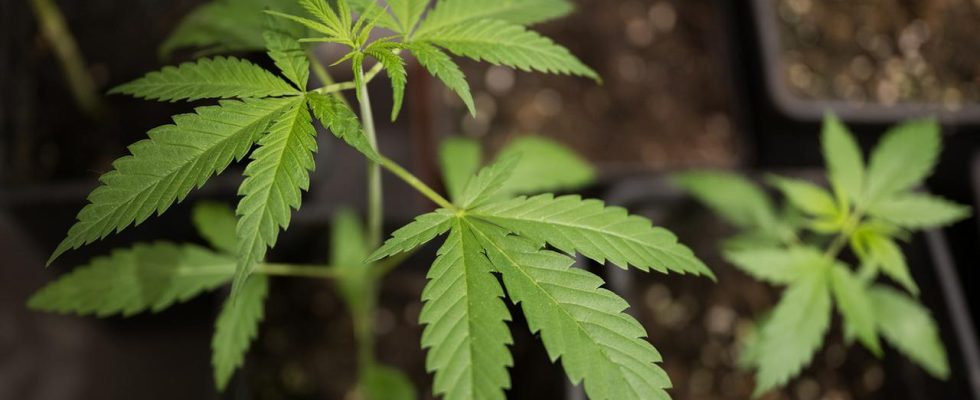A regulation in the Cannabis Act stipulates that tens of thousands of fines must be waived. The justice ministries of the federal states are up in arms about this. It is also completely unclear who should control the cultivation.
On March 22nd, the Federal Council is scheduled to vote on the traffic light government’s planned cannabis law. But there is criticism from the ranks of the justice ministers. The law will create a huge “bureaucratic monster” for the judiciary, said Berlin’s Justice Senator Felor Badenberg (independent) in an interview with the ARD-Politics magazine Contrasts. Against this background, she calls the federal government’s actions “absolutely irresponsible”.
The Cannabis Act stipulates that sentences that have not yet been fully enforced for cannabis offenses that would no longer be punishable in the future must be waived. Badenberg is calling for this amnesty regulation to be deleted or for the judicial authorities to be given a generous transition period in order to process a large number of affected cases.
It has not yet been possible to determine how many there are in total. Statements from state ministries of justice at the request of Contrasts However, suggest that there are probably at least tens of thousands of cases nationwide.
Penalties that have already been imposed could be waived
The judiciary should examine those enforcement proceedings individually. For example, the Berlin public prosecutor’s office says it would have to examine around 3,500 cases to determine whether legally binding judgments fall entirely or partially under the amnesty regulation.
“You have to look at which files could be relevant. Then these files from the archive rooms, from the basement rooms first have to be compiled and then they have to be viewed manually,” said Badenberg.
Anyone who is in prison for a cannabis offense may have to be released immediately. But it also needs to be checked: “Was there only the accusation of cannabis possession or were there also other crimes involved, such as theft, breach of trust, receiving stolen property? A new punishment must be determined.”
Problems “homemade”?
Andreas Gerhold from the “Cannabis Social Club Hamburg” cannot understand the criticism from the judicial authorities. The public prosecutor’s office’s problem was of its own making, he explained in an interview Contrasts: “The legislative process has been underway for a good two years and everyone knows what’s coming.”
The public prosecutor’s office could have pre-sorted the cases long ago. “In a constitutional state, lawyers cannot really say that it is too much work for them to suspend punishments that have been politically recognized as unjust and for which there has been a change in the law,” said Gerhold.
This position is also represented by the “New Judges’ Association”, which is considered to be liberal. The Federal Council had already dealt with the draft law in September of last year. “He had already recognized at that point in time that the regulation would mean organizational effort for the judiciary. It would therefore have been possible – and necessary – to take precautions for the enactment of the law,” she explains in a statement.
In addition, the lack of digitalization of procedural management and the insufficient recording of the reasons for convictions, which are now expected to lead to considerable additional work in examining enforcement proceedings, should not be at the expense of those convicted.
In a statement to the federal states, the Ministry of Health rejects the criticism of the judicial authorities and assumes that there are significantly fewer cases that need to be checked.
Countries fear additional costs
A declared aim of the traffic light government is to reduce the burden on the authorities with the new law. One ContrastsHowever, a query of all state ministries of justice revealed that only Bremen expects long-term relief. A spokeswoman for Justice Senator Claudia Schilling from the SPD wrote: “We assume that once the retroactivity issue has been dealt with, there will be significantly fewer cases against cannabis consumers than before.”
Eight state justice ministries shared Contrasts with, they cannot yet estimate the long-term costs. In Bavaria, Berlin, Brandenburg, Hesse, Mecklenburg-Western Pomerania, Lower Saxony and Rhineland-Palatinate, however, ongoing additional burdens are expected due to the cannabis law.
Berlin’s Senator for Justice Badenberg complained Contrasts its detailed regulations. Consumers in public would have to keep a distance of 100 meters from the entrances to schools and daycare centers. Places where weed is allowed to be smoked in densely populated cities would be the exception rather than the rule. It would also be the responsibility of the authorities to monitor compliance with these distances.
Unclear responsibility
The sale of cannabis should remain prohibited under the new law. However, it should be possible for so-called cultivation associations to collectively grow cannabis and distribute it to their members. The associations would have to apply for a license for this. This should only be possible from July, although the law is currently scheduled to come into force in April.
According to the law, the states should be responsible for issuing licenses and monitoring the cultivation associations. Upon request from Contrasts to the Senate and State Chancellery of the states shows that the responsibilities have not yet been clarified. The state governments speak vaguely about ongoing votes in the departments or are keeping a low profile because the law is not yet in place.
Only Bavaria is very specific in its answer: they want to enforce the law very restrictively and are therefore working on a central control unit.
You can see more on this and other topics at 9:45 p.m. on Contrasts in the First.

